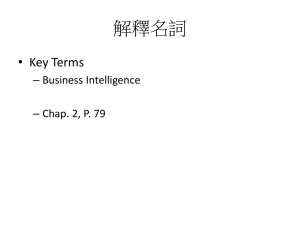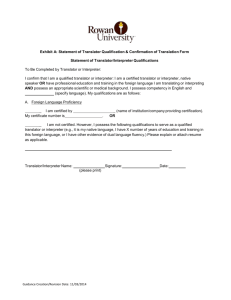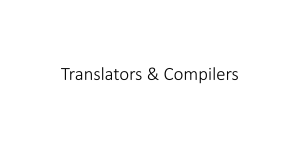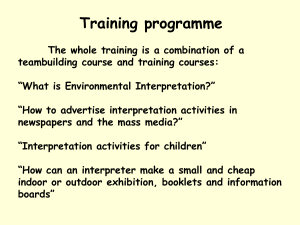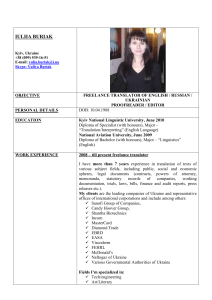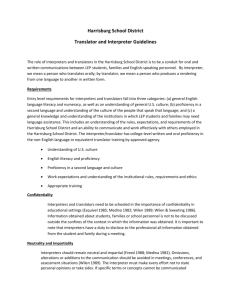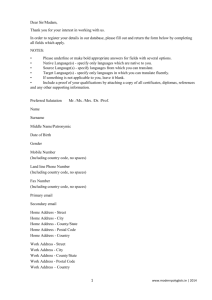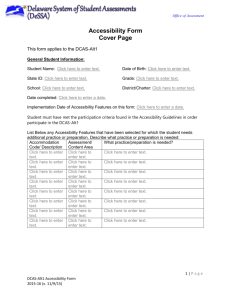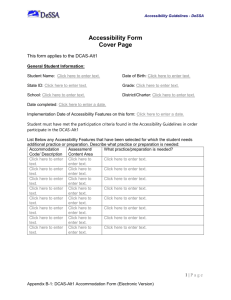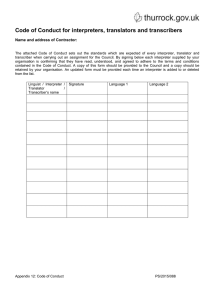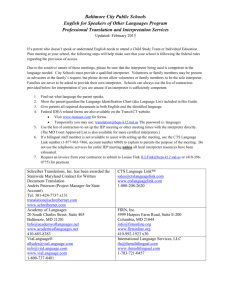中英筆譯(II)
advertisement
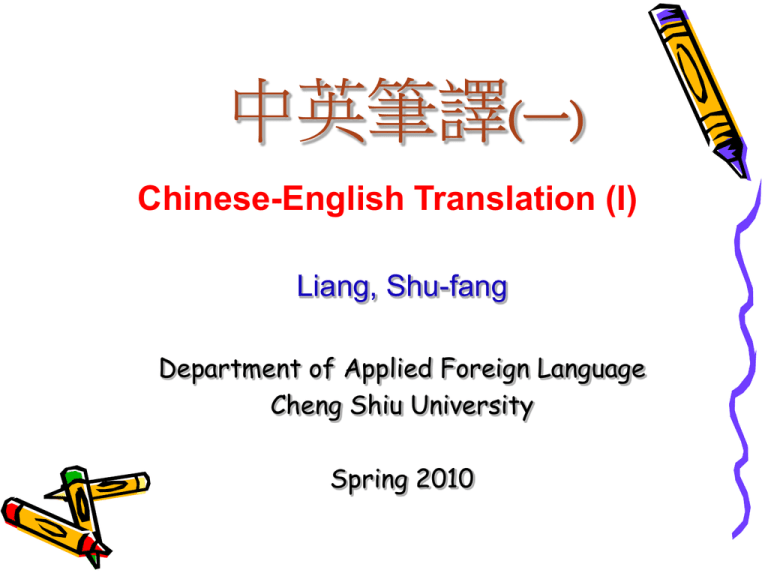
中英筆譯(一) Chinese-English Translation (I) Liang, Shu-fang Department of Applied Foreign Language Cheng Shiu University Spring 2010 課程大綱 ․中國翻譯史簡介 ․翻譯的標準、過程、及對譯作的要求 ․英漢語言的對比 ․英譯漢常用的方法和技巧(上) (1) 詞義的選擇、引伸和褒貶 (2) 詞類轉譯法(一) (3) 詞類轉譯法(二) (4) 增詞法(一) (5) 增詞法(二) (6) 重複法(一) (7) 重複法(二) (8) 省略法 第一章 中國翻譯史簡介 •佛經的翻譯 •介紹西歐各國科學、文學、哲學 的翻譯家 •嚴復提出-信、達、雅翻譯標準 •五四是中國近代翻譯史的分水嶺 (白話文代替了文言文) •魯迅是翻譯工作上理論與實踐相 結合的典範 嚴復―文學史上最有影響力的翻譯家 • 【2006/02/15 聯合報】 歷史所不會忘記的嚴復,是翻譯家嚴復所發揮的 巨大影響。… 他為譯事所立下的「信達雅」三原 則,解讀歧義雖多,恐怕迄今仍是最多人奉行的 準則… • 嚴復的主要身分不是文學家,但他也留下 不少詩文創作;他的翻譯所以一出現即造 成風潮,除了當中的意念,譯筆的文學質 地也絕對是關鍵。桐城大家吳汝綸便曾稱 讚他的文章「往復頓挫,深美可誦」。用 魯迅的話,則是「搖頭晃腦的讀起來,真 是音調鏗鏘」。 zh.wikipedia.org/wiki/嚴復- 第二章 翻譯的標準、過程、 及對譯作的要求 • 翻譯的標準 忠實-忠於原作的內容 ”保持原作的丰姿”(魯迅) 通順-明白曉暢的現代語言 ”力求其易解” (魯迅) 翻譯的評鑑基準: •以原文為重心― 以經典翻譯為對象,如:中國的佛經翻譯或是西方 的聖經翻譯; •以譯文為重心― 以實務翻譯為對象,如:新聞翻譯、經貿翻譯、 操作手冊、企業年報、影片翻譯、網頁翻譯等; *公文或合約書以忠於原文為準,但書寫格式宜遵循譯文 規範,以免造成與譯文語體風格不協調。 第二章 翻譯的標準、過程、 及對譯作的要求 • 翻譯的過程 1. 理解-(一)理解語言現象 (二)理解邏輯關係 (三)理解原文所涉及的事物 2. 表達-(一)直譯 (二)意譯 3. 校核-(一)校核譯文在人名、地名、日期、方位、數字等方面有無錯 漏 (二)校核譯文的段、句或重要的詞有無錯漏 (三)修改譯文中譯錯的和不妥的句子、詞組和詞 (四)力求譯文沒有冷僻罕見的詞匯或陳腔濫調,力求譯文段落、 標點符號正確無誤 (五)通常必須校核兩遍:校核內容、潤飾文字→定稿 第二章 翻譯的標準、過程、 及對譯作的要求 • 對翻譯工作者的要求 (一)必須謙虛謹慎,嚴肅認真,切忌草率從事,粗枝 大葉,望文生義 (二)必須不斷努力提高自己的母語與外語的水準 (三)還要注意不斷吸收和豐富各種基礎知識,對有關 國家的歷史、地理、政治、軍事、外交、經濟、 文化、科學、風俗習慣等方面,都應有較多的了 解。 Tips for translators • Love language, especially your own. • Learn to write well. • Learn about and study the language and the culture it comes from. • Select and study a specialist area of expertise. • Read: books, newspapers, blogs, magazines, . . . • Listen: to TV, the radio, friends and family, strangers in the street, on the bus, in bars, in shops, . . . • Attend workshops, seminars and conferences in your subject area. • Keep up with current affairs. • Keep your IT skills up-to-date. 第三章 英漢語言的對比 • 英漢詞匯現象的對比 一、詞的意義方面 二、詞的搭配能力方面 三、詞序方面 (一)定語的位置 (二)狀語的位置 第三章 英漢語言的對比 •句子結構 •句序 •句子內容的一些其他表達手段 (一)英語句子漢譯時,根據漢語表達習慣可以作些增補 (二)英語句子漢譯時,根據漢語表達習慣可以作些省略 (三)英語句子漢譯時,根據漢語表達習慣可以改變詞類 (四)英語句子漢譯時,根據漢語表達習慣以及上下文聯 繫,可以把正面表達的句子從反面來表達,或把反 面表達的句子從正面來表達 第四章 英譯漢常用的方法和 技巧(上) •詞義的選擇、引伸和褒貶 一、詞義的選擇 (一)根據詞在句中的詞類來選擇和確定詞義 Like knows the like. 英雄識英雄。(名詞) (二)根據上下文聯繫以及詞在句中的搭配關係來選擇和確定詞義 The is the last place where I expected to meet you. 我怎麼也沒料到會在這個地方見到你。 第四章 英譯漢常用的方法和 技巧(上) 二、詞義的引申 (一)將詞義作抽象化的引申 Every life has its roses and thorns. 每個人的生活都有甘有苦。 (二)將詞義作具體化的引申 Vietnam was his entrée to the new Administration, his third incarnation as a foreign policy consultant. 越南戰爭成了他進入新政府的敲門磚。他擔任 政府的對外政策顧問,那是第三次了。 第四章 英譯漢常用的方法和 技巧(上) •詞義的褒貶 為了忠實於原文的思想內容,翻譯時必須正 確 理解原作者的基本立場和觀點,然後選用適當 的語言手段來加以表達。 “He was polite and always gave advice willingly,” she recalled. 她回憶說:「他彬彬有禮, 總是誨人不倦。 」 作業 How to Be a Good Interpreter/translator By Alicia Bodine, eHow Contributor updated July 03, 2011 If you are fluent in two or more languages, you can apply to become either an interpreter or a translator. A translator converts text from one language into another language. An interpreter translates oral language back and forth so that it can be understood by parties who speak different languages. An interpreter may also translate sign language for people who are deaf. Being a good interpreter or translator, however, involves more than just translating a language. Instructions 1. Familiarize yourself with the culture from which the language you are interpreting originates. This will help you to better understand the person for whom you are interpreting so that you can make his words and meaning more clear. 2. Study vocabulary words for both languages consistently. This is especially important when translating documents. 3 Take notes and study the subject matter in which you will be required to translate or interpret. For example, If your job is to interpret at a conference on heart disease, it will be helpful to obtain a copy of the agenda so that you can research any words or concepts with which you are currently unfamiliar. 4. Practice good communication and customer service skills. Your goal is to make both parties feel comfortable with one another while you help to express their wants and needs. An interpreter also needs to be able to be comfortable in many environments. You may be required to work in a school, a courtroom or a hospital. 5. Volunteer to gain more experience and to keep your skills sharp. Social services offices, hospitals, churches and private organizations appreciate help from interpreters and translators. Some jobs also require several years of experience, which you can obtain through volunteering on a regular basis. 6. Attain a certification, which demonstrates that you have attained proficiency. You can receive certification through the American Translators Association, the federal court, the state court and the National Association of the Deaf. In addition, the U.S. Department of State issues certification for Navajo, Haitian Creole and Spanish interpreters. nannu.info

